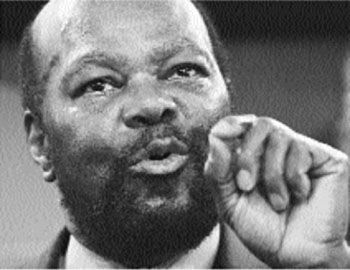
The cause was complications from Parkinson's disease, said his son Niger Innis, the national spokesman for CORE, where Innis became national chairman in 1968.
Innis rose to prominence in the 1950s and 1960s as a CORE activist in Harlem, where he had settled after an early childhood in the U.S. Virgin Islands.
Founded in 1942 by activists including James Farmer, CORE had a storied reputation in the movement for racial equality. Its members had aided protesters who led the sit-in at a Woolworth's lunch counter in Greensboro, N.C., in 1960. CORE also helped organize the Freedom Rides, in which protesters risked their safety to challenge segregation in interstate transit.
Innis, who described himself as "a serious economic and political and cultural black nationalist," led a marked change at CORE, which had been known for its adherence to the principles of nonviolence and its inclusion of like-minded whites in its work. He distinguished himself from many other civil rights leaders by applying a conservative, at times libertarian, worldview to his advocacy work.
He described activists such as Sharpton as "politicized in left-wing nonsense" and once told Newsday that he was "sick" of them "defining the African-American community." In 1988, appearing with Sharpton on "The Morton Downey Jr. Show" to discuss the discredited rape claims of Tawana Brawley, Innis pushed Sharpton to the ground after the fellow activist taunted him as a "bigot."
The same year, he engaged in a physical altercation with a white Aryan activist on Geraldo Rivera's TV talk show, remarking that he had delivered "the Sharpton treatment" to the man. In another noted television moment, from 1973, he debated William B. Shockley, the Nobel laureate in physics who cited genetic reasons for what he regarded as black inferiority.
Innis traced his philosophy to the shooting deaths of two sons - Roy Innis Jr., who died at 13 while playing outside in 1968, and Alexander Innis, who died at 26 in 1982 in what the Associated Press described as an apparent robbery.
"After the murders of my sons I did not want other parents to go through what I went through," Innis told Newsday in 1993. "My sons were not killed by the KKK or David Duke. They were murdered by young, black thugs. I use the murder of my sons by black hoodlums to shift the problems from excuses like the KKK to the dope pushers on the streets."
He opposed busing as a way of achieving integration in schools, telling the New York Times that "you cannot define desegregation as the idea that black kids can't learn outside the presence of white kids." He instead advocated greater community control of school district finances and leadership.
Gun control, he told blacks, "was not meant to protect your safety; it was meant to deprive you of your freedom." He was a board member of the National Rifle Association. Affirmative action, he argued, worked against the advances of the Civil Rights Act of 1964, which outlawed discrimination in employment.
According to CORE, the organization under his leadership provided services related to education and job training. In addition, Innis participated in political monitoring in Nigeria as well as in a 1973 summit of the Organization of African Unity. He drew criticism for his refusal in the 1970s to speak out against the brutality of Ugandan strongman Idi Amin, in what scholar Henry Louis Gates Jr. once described as "some misbegotten sense of racial solidarity."
By 1978, Farmer and other CORE leaders denounced Innis for "pursuing a course of violence, corruption and compromise." Two years later, a faction of members unsuccessfully sought to replace him, arguing that he had used the group "for personal gain, egotism and grandiose plans." In the later years of his leadership, the organization was reported to be mired in debt.
Roy Emile Alfredo Innis was born in Christiansted on the island of Saint Croix on June 6, 1934. His father, a police officer, died when Innis was 6, and when he was 12 his mother took the family to New York.
After Army service, Innis studied chemistry at the City College of New York and worked as a chemist for the Vicks company and at a hospital in the Bronx.
He joined CORE in the 1950s, telling the Times that he enrolled mainly because of a girlfriend, who participated in the activities of the Harlem chapter. He worked on issues including police brutality and economic revitalization in Harlem before rising through the organization's ranks.
In what Innis described as a conspiracy to "besmirch my image and reputation," CORE endured an investigation of its fundraising practices, and he also faced an assault charge, for which he was acquitted in 1982.
Innis mounted unsuccessful primary challenges to U.S. Rep. Major R. Owens, D-N.Y., in 1986 and New York City Mayor David N. Dinkins (D), the first African American to hold that post, in 1993.
Innis once told the Times that he had been married "more than once and fewer times than Elizabeth Taylor." According to CORE, his survivors include nine children, Cedric, Kwame, Niger, Kimathi, Mugabe, Arenza, Patricia, Corinne and Lydia; two sisters; and numerous grandchildren.
"My brand of conservatism is the traditional, most decent and rational expression of the American personality," Innis once told the Times. "I believe that the success of America has been the application of pragmatism in society, and that view is particularly unfashionable in the civil rights movement."


 Contact The Editor
Contact The Editor
 Articles By This Author
Articles By This Author